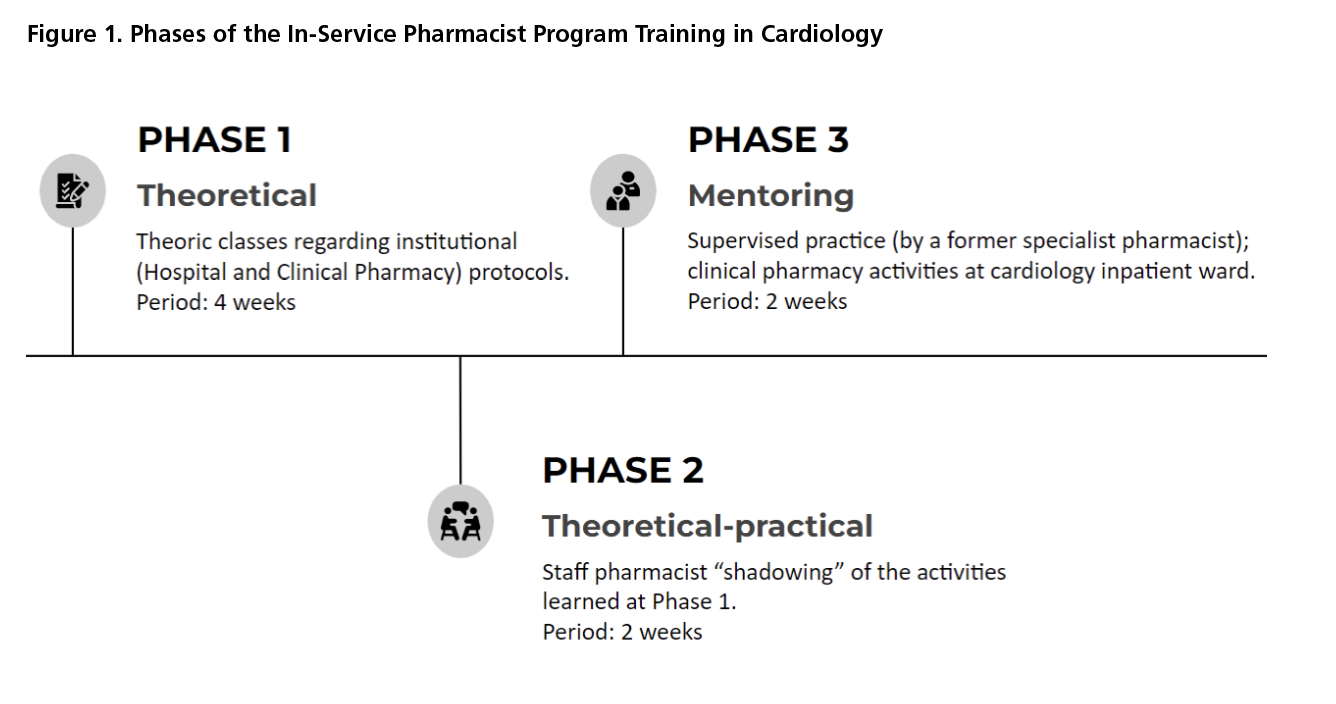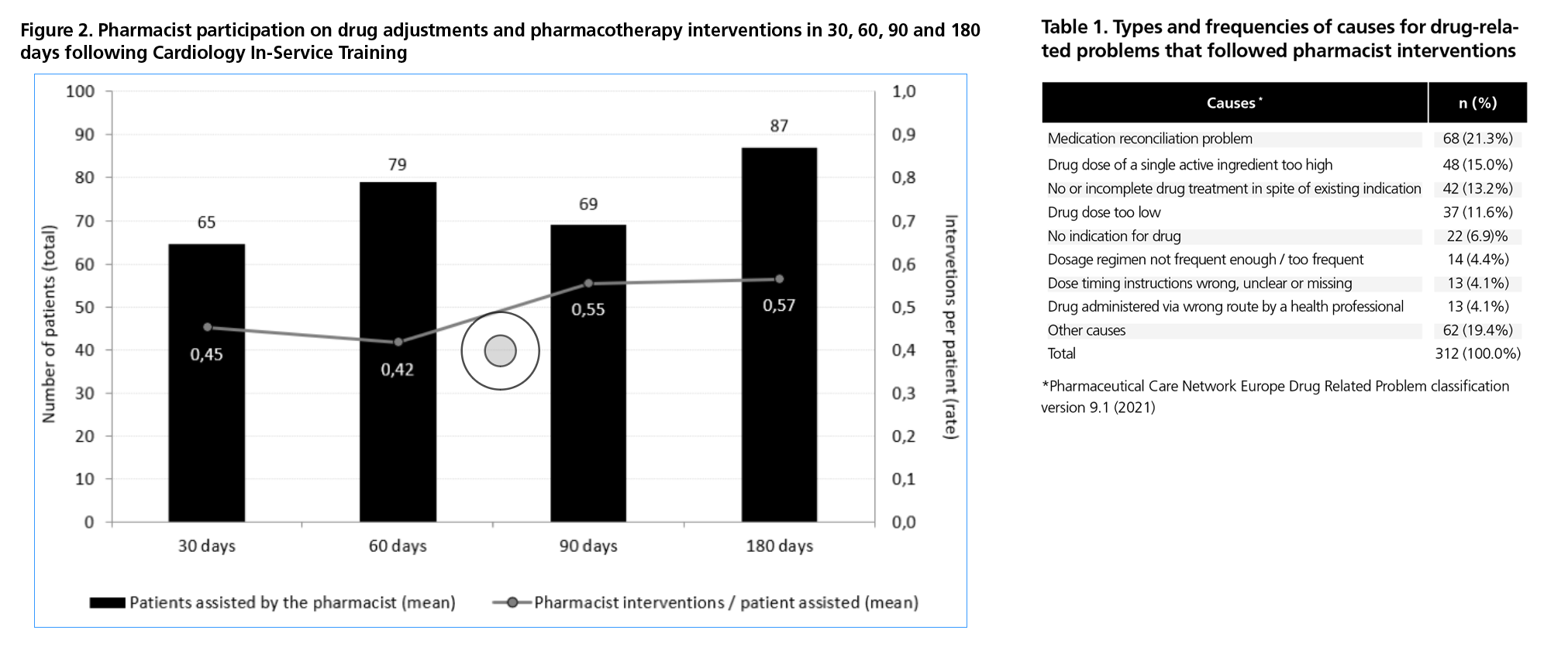Einsfeld L¹, Floriano dos Santos JA2, Fagundes ML 3
- Clinical Pharmacy Division, Hospital de Clínicas de Porto Alegre. Brazil.
- Jephesson Alex Floriano dos Santos, Clinical Pharmacy Division, Surgical Intensive Care Unit, Federal University of Paraná Hospital de Clínicas.
- Marlise Lara Fagundes, Canoas Healthcare Foundation (Fundação Municipal de Saúde de Canoas)
Fecha de recepción: 4/04/2023 – Fecha de aceptación: 28/04/2023
Correspondencia: Lidia Einsfeld · Clinical Pharmacy Division, Hospital de Clínicas de Porto Alegre. · leinsfeld@hcpa.edu.br
____
Introduction: Cardiovascular diseases are the leading causes of mortality in Brazil, and cardiology specialized pharmacists can contribute to improve patients outcomes, in a variety of settings. This study aims to describe a seminal in-service training program in Cardiology, targeting newly hired pharmacists with no prior experience in the area.
Methods: Two generalist pharmacists received a 60-day training consisting of 3 phases (theoretical classes, pharmacist ‘shadowing’ and supervised practice) with a former cardiology pharmacist. Evaluation of the program was carried out: December 20 to May 21 pharmacists’ interventions were retrospectively analyzed and categorized.
Results: Following the training program, each trainee attended a mean of 75.7 ± 13.3 hospitalizations per month, with half of the patients receiving at least 1 intervention in their pharmacotherapy, suggested by the pharmacist.
Conclusion: The proposed in-service program may represent a feasible option to general pharmacist’s and institutions in need for specialized training in cardiology.
Keywords: cardiovascular, pharmacist, pharmacy education, pharmaceutical care, team-based care, training
Enfrentando Enfermedades Cardiovasculares en Latinoamerica: Reporte de Caso de Capacitación en Servicio para Farmacéuticos Clínicos Especialistas en Brasil
Introducción: Las enfermedades cardiovasculares son las principales causas de mortalidad en Brasil, y los farmacéuticos especialistas en cardiología pueden contribuir a mejorar los resultados de los pacientes, en una variedad de escenarios. Este estudio tiene como objetivo describir un programa seminal de capacitación en servicio, en el área de Cardiología, dirigido a farmacéuticos recién contratados sin experiencia previa.
Métodos: Dos farmacéuticos generalistas recibieron una formación de 60 días que constaba de 3 fases (clases teóricas, seguimiento del farmacéutico y práctica supervisada) con un farmacéutico especialista en cardiología. Se realizó la evaluación del programa: de diciembre 2020 a mayo 2021 se analizaron y categorizaron retrospectivamente las intervenciones de los farmacéuticos. Resultados: Siguiendo el programa de formación, cada practicante atendió una media de 75,7 ± 13,3 hospitalizaciones al mes, recibiendo la mitad de los pacientes al menos una intervención en su farmacoterapia, sugerida por el farmacéutico.
Conclusión: El programa en servicio propuesto puede representar una opción factible para los farmacéuticos generales y las instituciones que necesitan farmacéuticos con capacitación especializada en cardiología.
Palabras clave: cardiovascular, farmacéutico, educación farmacéutica, atención farmacéutica, atención en equipo, formación.
____
Introduction
Advanced and specialist development is one of International Pharmaceutical Federation (FIP) Development Goals for the decade ahead, reinforcing the need for specific skills and specialized competencies ¹ . In Brazil, despite the burden of cardiovascular diseases (CVDs), the multidisciplinary teams still cater to professionals with specific training in cardiovascular care.
In cardiac transplantation, for example, a recent study showed that only 56.2% of Brazilian heart transplant centers can count with a pharmacist as part of their multidisciplinary teams; and in those centers, none of the pharmacists had specific training in any level, with a majority declaring to have started their activities without previous experience ² . These data point to an unmet need of Brazilian cardiology institutions: hiring pharmacists who need to learn in practice, without training or previous experience, how to develop their clinical activities to patients with CVDs, without training or having previous experience in the area.
This case report aims to describe a seminal in-service training program in Cardiology, targeting newly hired pharmacists with no prior training, in southern Brazil.
The program was developed in a 900-bed tertiary academic hospital, counting on a Cardiology service that attends an average of 140 hospitalizations per month. Cardiology patients are distributed through diverse multidisciplinary teams (general cardiology, heart failure, cardiovascular surgery, heart transplant and cardiovascular emergencies); and alongside with cardiology wards, the hospital also relies on a coronary unit and a cardiac intensive care unit.
Methods
This is an observational study that evaluated a training program through the participation of a clinical pharmacist in the cardiology teams. Two generalist pharmacists have been hired and a 60-day training was ensued with a former cardiology pharmacist.
The study period was:
- Training program: October to November 2020.
- Retrospective analysis of the interventions performed between December 2020 and May 2021.
The training process was evaluated through the records of pharmaceutical interventions (PI) in the prescriptions of patients’ admissions, hospitalization follow-up and discharge, after 30, 60, 90 and 180 days after training.
Figure 1 summarizes stages of the training program and its descriptions.

Interventions were categorized according to the PCNE Classification V 9.1 ³. Data were analyzed by descriptive statistical analysis.
This project was approved by the institutional ethical board (CEP/HCPA), protocol #866904823.7.0000.5327, report #5.932.166.
Results
Following the end of training, 908 patients were assisted by the pharmacy trainees in the cardiology teams and wards, a mean of 75.7 ± 13.3 hospitalizations per month, during the study period. There was an increase in the PIs per patient in the periods of 30, 60, 90 and 180 days: 0.45, 0.42, 0.55 and 0.57; as described in Figure 2. Half of the patients receiving at least 1 PI made in their pharmacotherapy, suggested by the clinical pharmacist (total mean of 0.5 ± 0.07 PI/hospitalization). The most frequent causes of drug-related problems (that consequently triggered interventions) were medication reconciliation problems (21.3%), drug dosage too high (15%) and indication without/with insufficient treatment (13.2%), as described in Table 1. Intervention acceptance reached a mean rate of 88.87%.

Discussion
From our knowledge, this is the first in-service cardiology training devoted to pharmacists, in our country, despite the aforementioned Brazilian residency programs.
In Brazil there is still no regulatory recognition of advanced competences and specialization in the area of cardiology clinical pharmacy. In addition, there are only 10 cardiology pharmacy residency programs in Brazil 4 . Moreover, CVDs are the leading causes of death in Brazil (27.3%), which has been increasing over the last decades, a result of population aging 5 , and being responsible for high health costs 6,7 . Remarkably, CVD burden is unequal towards different Brazilian regions, varying according to their socioeconomic status 8 . In addition, despite the access to CVD pharmacotherapy being publicly funded and provided for free to patients, limited health literacy remains a challenge to overcome.
Pharmacists have an important role in adherence improvement 9 , and patients with CVDs are essentially at significant risk for medication errors and adverse drug events due to their poly-pharmacy 10 . Previous studies demonstrated the potential of patient education, discharge orientation and reconciliation performed by pharmacists, on cardiovascular clinical outcomes 11 . (Ho et al., 2014). Whether achieving blood pressure control, reducing heart failure hospitalizations or improving CVD risk factor management 12,13,14 ; pharmacists are uniquely positioned to play a role in the management of such challenging patients and contribute to multidisciplinary cardiology teams.
To amplify pharmacists’ contribution in the cardiovascular outcomes, specific training is needed. In the United States, for example, cardiology specialization is a board certified field of specialization and strategies are being promoted to share opportunities for integrating clinical pharmacists into a team-based care model (Dunn et al., 2015). The International Pharmaceutical Federation has defined the Advanced and Specialist Development as the Development Goal number 4 for the decade ahead, aiming to globally have “education and training infrastructures in place for the recognised advancement of the pharmaceutical workforce as a basis for enhancing patient care and health system deliverables” (International Pharmaceutical Federation, 2022).
To achieve this, one of the mechanisms is the systematic use of professional programs, systems and structures as markers of advancement and expertise. In this case report, we present a proposal of an in-service training, focused on utilizing the expertise already developed inside an institution, valuing the expertise of professionals who have been in the area for a few years to train and mentor new colleagues without prior experience: a 5-year experienced professional trained two other clinical pharmacists in a 3-phase 60-days training programme and the results of trainee’s pharmacotherapy recommendations were analyzed. Because the subjects did not have previous experience in the area, no measurements were taken prior to training, for comparison purposes. However, we observed that after the end of training, the higher are PI ratios, data that can possibly infer a higher empowerment of pharmacists on cardiovascular care and treatments (Figure 2).
Conclusion
The proposed in-service training program presented in this study represents a feasible option to the general pharmacist’s need for training in cardiology, focused on graduated pharmacists with no previous experience in the area. New studies can be carried out to verify the effectiveness of this proposed training program to other clinical pharmacy areas, or even in cardiology subspecialties.
Conflictos de intereses: Los autores declaran no tener conflictos de intereses.
Bibliography
- International Pharmaceutical Federation (FIP). The FIP Development Goals Report 2021: Setting goals for the decade ahead [Internet]. The Hague: International Pharmaceutical Federation; 2022 [cited 2023 April 4]. Available at: https://www.fip.org/file/5095
- Einsfeld L, Hastenteufel LCT, Taber D, Clausell N, Goldraich LA. Challenges for expansion of thoracic transplant clinical pharmacy in a developing country: comparison with U.S. accredited centres and call for action. Journal of Clinical Pharmacy and Therapeutics. 2021;7:588–591. https://doi.org/10.1111/jcpt.13577
- Pharmaceutical Care Network Europe Association [Internet]. The PCNE Classification V 9.1 [cited 2023 April 4]. Available at: https://www.pcne.org/upload/files/417_PCNE_classification_V9-1_final.pdf
- Federal Pharmacy Council [Internet]. Residency Hub [cited 2023 April 4]. Available at: https://comunicacaocff.wixsite.com/residencia/mapa-das-residencias-
- Ribeiro AL, Duncan BB., Brant LC, Lotufo PA, Mill JG, Barreto SM. Cardiovascular Health in Brazil: Trends and Perspectives. Circulation. 2016;133(4):422–433. https://doi.org/10.1161/CIRCULATIONAHA.114.008727
- Roth GA, Mensah GA, Johnson CO, Addolorato G, Ammirati E, Baddour LM, et al. GBD-NHLBI-JACC Global Burden of Cardiovascular Diseases Writing Group (2020). Global Burden of Cardiovascular Diseases and Risk Factors, 1990-2019: Update From the GBD 2019 Study. Journal of the American College of Cardiology. 2020;76(25):2982–3021. https://doi.org/10.1016/j.jacc.2020.11.010
- Oliveira GMM, Brant LCC, Polanczyk CA, Biolo A, Nascimento BR, Malta DC, et al. Estatística Cardiovascular – Brasil 2020. Arq. Bras. Cardiol. 2020;115(3):308-439. https://doi.org/10.36660/abc.20200812
- Brant LCC, Nascimento BR, Passos VMA, Duncan BB, Bensenõr IJM, Malta DC, et al. Variations and particularities in cardiovascular disease mortality in Brazil and Brazilian states in 1990 and 2015: estimates from the Global Burden of Disease. Variações e diferenciais da mortalidade por doença cardiovascular no Brasil e em seus estados, em 1990 e 2015: estimativas do Estudo Carga Global de Doença. Brazilian journal of epidemiology. 2017;20(Suppl01):116–128. https://doi.org/10.1590/1980-5497201700050010
- Chisholm-Burns MA, Kim Lee J, Spivey CA, Slack M, Herrier RN, Hall-Lipsy E, et al. US pharmacists’ effect as team members on patient care: systematic review and meta-analyses. Medical care. 2010;48(10):923–933. https://doi.org/10.1097/MLR.0b013e3181e57962
- Abolbashari M, Macaulay TE, Whayne TF, Mukherjee D, Saha S. Polypharmacy in Cardiovascular Medicine: Problems and Promises!. Cardiovascular & hematological agents in medicinal chemistry. 2017;15(1):31–39. https://doi.org/10.2174/1871525715666170529093442
- Ho PM, Lambert-Kerzner A, Carey EP, Fahdi IE, Bryson CL, Melnyk SD, et al. Multifaceted intervention to improve medication adherence and secondary prevention measures after acute coronary syndrome hospital discharge: a randomized clinical trial. JAMA internal medicine. 2014;174(2):186–193. https://doi.org/10.1001/jamainternmed.2013.12944
- Carter BL, Rogers M, Daly J, Zheng S, James PA. The potency of team-based care interventions for hypertension: a meta-analysis. Archives of internal medicine. 2009;169(19):1748–1755. https://doi.org/10.1001/archinternmed.2009.316
- Santschi V., Chiolero A, Paradis G, Colosimo AL, Burnand B. Pharmacist interventions to improve cardiovascular disease risk factors in diabetes: a systematic review and meta-analysis of randomized controlled trials. Diabetes care. 2012;35(12):2706–2717. https://doi.org/10.2337/dc12-0369
- Koshman SL, Charrois TL, Simpson SH, McAlister FA, Tsuyuki RT. Pharmacist care of patients with heart failure: a systematic review of randomized trials. Archives of internal medicine. 2008;168(7):687–694. https://doi.org/10.1001/archinte.168.7.687
- Dunn SP, Birtcher KK, Beavers CJ, Baker WL, Brouse SD, Page RL, et al. The role of the clinical pharmacist in the care of patients with cardiovascular disease. Journal of the American College of Cardiology. 2015;66(19):2129–2139. https://doi.org/10.1016/j.jacc.2015.09.025
____
